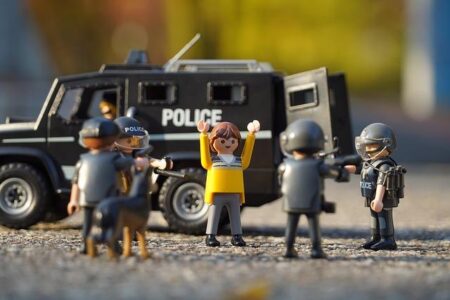Keke Palmer Calls for National Guard Solidarity with Los Angeles Protesters
In the midst of escalating demonstrations throughout Los Angeles, Keke Palmer has made a compelling public appeal urging the National Guard to actively support, rather than merely oversee, the protesters. She stressed the necessity for the Guard to move beyond traditional crowd control roles and instead serve as genuine protectors of those courageously advocating for change. Palmer’s remarks highlight a push for a more compassionate and community-centered approach to managing protests, challenging the usual law enforcement tactics employed in the city.
She brought attention to several critical issues, including:
- Transparency: Demanding openness from both law enforcement and National Guard personnel regarding their conduct.
- Safety: Ensuring demonstrators can exercise their right to peaceful assembly without fear of harm.
- Collaboration: Promoting partnership between armed forces and civilians to foster unity instead of confrontation.
This appeal has ignited widespread conversations about redefining the National Guard’s involvement in domestic protests, emphasizing the delicate balance between maintaining order and respecting civil liberties.
Redefining the National Guard’s Function During Civil Unrest
The National Guard’s deployment during episodes of civil unrest has historically focused on restoring order and protecting vital infrastructure, especially when local police forces are stretched thin. However, recent nationwide protests have sparked calls for a paradigm shift toward a more community-oriented role. Influential voices like Keke Palmer advocate for the Guard to act not just as enforcers but as active guardians who engage empathetically with protesters to ensure safety for all parties involved. This evolving viewpoint invites a reassessment of how military presence intersects with civil rights and public trust.
- Building Community Trust: Encouraging the Guard to establish rapport with demonstrators rather than adopting a purely defensive stance.
- Nonviolent Conflict Resolution: Prioritizing de-escalation techniques to ease tensions without escalating confrontations.
- Accountability Measures: Implementing oversight to monitor Guard actions and prevent misconduct, thereby enhancing public confidence.
| Dimension | Conventional Role | Emerging Role |
|---|---|---|
| Core Objective | Maintaining order | Upholding civil liberties |
| Engagement with Protesters | Control and enforcement | Support and protection |
| Public Image | Authority enforcer | Community partner |
This ongoing dialog reflects the tension between ensuring public safety and preserving democratic freedoms. As protests persist in cities like Los Angeles, the demand for the National Guard to “march alongside” demonstrators symbolizes a broader societal call for more empathetic and balanced approaches to civil unrest.
Community Reactions and Demands for Enhanced Protective Measures
In response to the widespread protests in Los Angeles, numerous community advocates and leaders have echoed Keke Palmer’s call for the National Guard to adopt a more compassionate and protective stance toward demonstrators. Amid rising concerns over violent clashes between law enforcement and protesters, residents have stressed the need for security forces to align more closely with the communities they serve. Many have advocated for a shift from intimidation tactics to a protective presence, emphasizing the importance of specialized training in de-escalation, cultural awareness, and human rights.
Key community requests for improved protection include:
- Establishment of autonomous oversight bodies
- Assignment of community liaison officers during protests
- Greater transparency regarding use-of-force protocols
- Expansion of mental health support for both officers and civilians
| Protective Initiative | Community Benefit |
|---|---|
| De-escalation Training | Fewer violent encounters, safer demonstrations |
| Independent Oversight | Enhanced accountability and trust |
| Community Liaison Officers | Improved dialogue and understanding |
| Mental Health Resources | Better stress management and resilience |
Enhancing Cooperation Between Authorities and Protesters
Effective collaboration between law enforcement and demonstrators depends on mutual respect and transparent communication.One promising strategy involves forming joint planning committees that include representatives from both sides to coordinate protest logistics, routes, and safety protocols ahead of events. This proactive engagement helps prevent misunderstandings and fosters shared obligation. Additionally, maintaining open communication channels through social media or designated liaisons ensures timely updates and responsiveness during protests.
Another vital component is complete de-escalation training for officers, focusing on empathy and cultural sensitivity. When paired with demonstrators’ commitment to peaceful and clear communication, these measures can significantly reduce tensions. The table below summarizes key approaches to improving cooperation:
| Approach | Advantage |
|---|---|
| Joint Planning Committees | Clear expectations,reduced conflicts |
| De-escalation Training | Lower violence,increased trust |
| Transparent Communication | Real-time updates,conflict mitigation |
| Defined Protest Protocols | Orderly demonstrations,legal clarity |
Conclusion
As protests continue to unfold in Los Angeles,Keke Palmer’s outspoken request for the National Guard to stand in solidarity with demonstrators highlights the urgent demand for accountability and protection amid civil unrest. This evolving situation remains a critical point of focus for activists and officials alike, underscoring the complex relationship between public safety forces and citizens advocating for justice. The coming weeks will be pivotal as the city seeks to navigate these challenges with empathy and respect for democratic rights.




